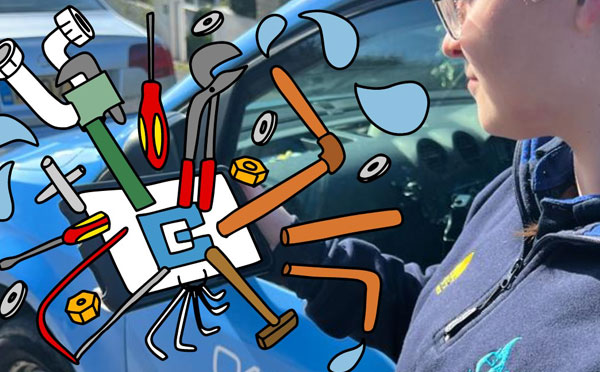Where are all the female apprentices? Why are so few attracted to jobs in the trades?
These are the questions I posted two weeks ago. Thank you to everyone who shared and commented, I really value all your contributions. This is a topic that is very important at BigChange – and to all our customers.
I want to return to this theme now, during an important week for women, when the whole world is talking about International Women’s Day. Every business, every product, every service benefits from input by a diverse group of individuals.
I’ve been around a long time, and I’ve seen it: teams perform better when they have a balance of men and women. That’s just how it is.
This is why I was so alarmed to see the research from RatedPeople.com, claiming that women make up less than 1% of carpenters and joiners in the UK, and less than 2% of electricians, plumbers and metal workers. Without more women taking on these roles, championing women-led design, and providing role models for future generations, we are missing out on their vital contribution to the industry.
To find out why there are so few women taking this route, I caught up with Lili Baines, an apprentice at Gas Smart Heating in Brighton & Hove, to find out how she found her way into the trades – and asked how we can encourage more women to follow in her footsteps.
At BigChange, we love people like Lili, and love to see them progress and thrive. Here’s her story.
Lili’s experience
“I started thinking seriously about changing career in the summer of 2020. It was during lockdown, and I was working for a call centre. I had been to university, but it hadn’t really gone anywhere. I came out the other side saddled with loads of debt. I thought, ‘What am I doing? Is this the life I want?’
“During my school days, I was never given the opportunity to think about manual trades or vocational careers. It just wasn’t part of the careers advice when I was young. But while working from home for that call centre, and dreaming about a better life, I started Googling other options. That’s when I found Stopcocks on Facebook.
“It’s a group for women plumbers, and the page was packed with useful information about the training required. I met loads of supportive women through that network and realised that it could be easier than I had thought to start retraining.
“Unfortunately, most of the women on that group were based quite far away so they advised me to start calling up local firms to see if they needed an apprentice. I was lucky; Gas Smart Heating was the first company I found. When I looked at the website, I saw they already had a female heating engineer and the message on their ‘join the team’ page was simple: ‘Get in touch if you share our enthusiasm’.”
‘People want to give you a chance’
“I called up and explained who I was and what I wanted to achieve. I went out with the team over four Saturdays so they could assess my drive and aptitude. In life, if you show a bit of willing, people will usually give you a chance. They invited me to join as an apprentice.
“From the moment I started going out on jobs, I loved it. Doing something hands-on is completely new for me but I have always enjoyed thinking and solving problems and that’s a big part of heating and plumbing. You assess the clues to work out what’s going on. Then, you’re a hero when you get someone’s heating back on or give them hot water.
“None of my female friends work in this industry. Why aren’t there more of us? Part of the problem is that working-class jobs are often considered unskilled – even though that couldn’t be further from the truth.
“You’re told that if you don’t do well in your GCSEs, you can go and do something with your hands, but the truth is, people can make a lot more money – and develop incredible skills – by working in the trades. We need to get rid of that stigma.”
Hard to shake stereotypes
“We still live in a male-dominated world. As a girl in school, you’re taught that boys are strong – it’s always a big strong boy who is asked to carry a chair by the teacher. It’s hard to shake these labels, even when you grow into a strong-willed woman.
“But then I also noticed that many of the stereotypes applied to women are useful in this industry. Being organised, being able to communicate well, these are real assets. And the muscles will come too, in time!
“I do think that having women on the team is a huge benefit. We get a lot of jobs from women who live alone, who feel more comfortable with a woman engineer. They trust that I won’t overcharge them or take the mickey. As a woman sitting in the van, I get a lot of approaches from customers asking me to take on jobs. Women control most of the purchasing power in UK households after all.
“It’s not always easy to be an apprentice. You must make financial sacrifices in the short-term knowing that you are investing in your future. My partner and I live very frugally and that’s part of the drive to make it work. You learn as quickly as you can so that you can progress. This apprenticeship is only two and a half years, so it won’t be long till I’m on a trained gas engineer’s wage.”
Tips for employers
“To employers who are looking to attract female apprentices, I would say that it’s helpful if you already have women on your team. You don’t want to be the first and stick out like a sore thumb. I have also seen reports about a pay gap. Luckily for me, my boss believes in equal opportunities and equal pay. But there is still some sexism out there, and perhaps a lack of progression for women.
“When I first got started, my boss Steve Cahalane took into account that I might not be as strong as the other guys. So from day one, he made sure I had the best tools to make jobs easier. That means the investment in me might be a little higher, but I’m hoping that I’ll be a great return on that investment.
If you think about it, firms everywhere take a chance on a 16-year-old boy to become an apprentice. They may not know what they want to do. They might not really care about the trade. I hope I’m a better bet.”








